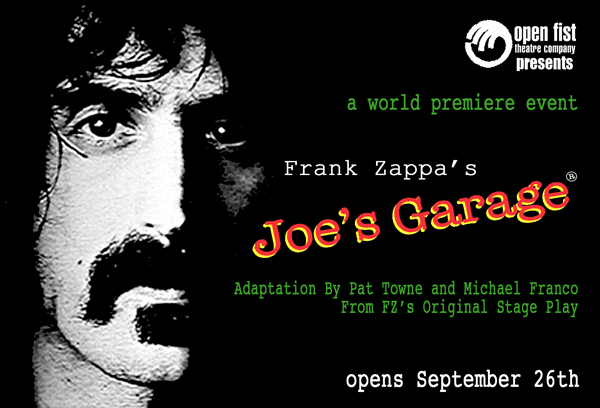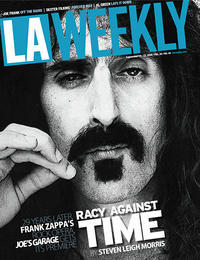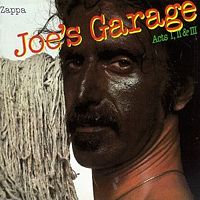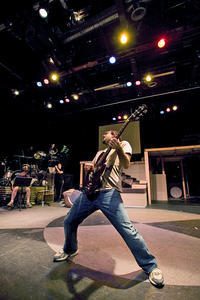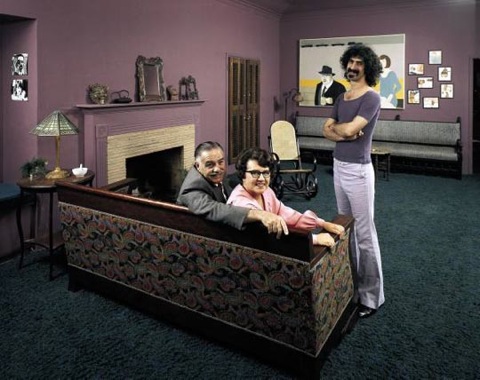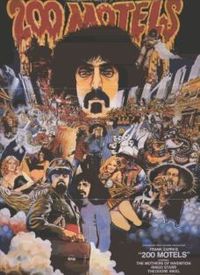 | Zappa''s Operas and Films |
|
|
|
|
|
|
|
|
Frank Zappa''s Joe''s Garage Gets Its Premiere 29 Years On
Rock opera, like its revered creator, was ahead of its time
By Steven Leigh Morris
Published on September 18, 2008
Some people can just see things coming. In 1979, one year before Ronald Reagan was elected president, Frank Zappa wrote a rock opera called Joeís Garage. Itís a ďstupid story,Ē said Zappa, a fantasia about a garage-band singer who finds himself at odds with an increasingly religious, controlling society in which music is eventually banned for its destructive effects on society.
Six years after Zappa completed it, the U.S. Senate held hearings on a proposal by Tipper Goreís Parents Music Resource Center (PMRC) to put warning labels on rock-music CDs and videos. Gore had been offended by the lyrics in the Prince song ďDarling NikkiĒ: ďI met her in a hotel lobby, masturbating with a magazine . ...Ē Children, said the PMRC, needed to be protected from sexually provocative lyrics.
Not surprisingly, Zappa, a satirist, celebrity rock musician and respected avant-garde composer, testified as an opposition witness (with John Denver and Twisted Sisterís Dee Snider), describing the PMRC proposal as ďan ill-conceived piece of nonsense, which fails to deliver any real benefits to children [and] infringes on the civil liberties of people who are not children.Ē
The next year, 1986, Zappa appeared on CNNís Crossfire, with so-called leftist journalist Tom Braden (a former employee of the CIAís International Organizations Division), conservative columnist Robert Novak and John Lofton of the right-leaning Washington Times. In a contentious conversation, Zappa revealed the prescience that makes Joeís Garage as relevant as the day it was written:
Lofton: Do you support records that promote incest as just another kind of sex, or in some instances it might even be preferable? Do you agree with that?
Zappa: No I donít agree with it. I donít have any interest in incest ... but I didnít realize that incest was such a terrible problem in the United States that we suddenly need government intervention ...
Lofton: Does the government have any purpose, Frank?
Zappa: Yeah, it has a number of purposes ... how about national defense?
Lofton: I consider this national defense, pal! Our families are under attack by people like you, with these lyrics.
Braden: John, you donít have to buy them.
Zappa: Can I make a statement about national defense? The biggest threat to America today is not communism, itís moving America toward a fascist theocracy, and everything thatís happened during the Reagan administration is steering us right down that pipe.
Novak: ... Do you really think ... in this country, with the permissiveness, that we are moving toward a fascist theocracy?
Zappa: You bet we are, buddy.
[Lofton and Novak laugh derisively.]
Braden: One example of a fascist theocracy?
Zappa: When you have a government that prefers a certain moral code derived from a certain religion, and that moral code turns into legislation to suit one certain religious point of view, and if that code happens to be very, very right wing, almost toward Attila the Hun ...
Lofton: Then you are an anarchist. Every form of civil government is based on some kind of morality, Frank.
Zappa: Morality in terms of behavior, not in terms of theology.
The ideas in this debate form the crux of the ribald cultural satire in Joeís Garage, which will have its world premiere on September 26 at the Open Fist Theater. The play opens with an Orwellian ďCentral Scrutinizer,Ē a large robotic puppet who speaks through a megaphone and whose job is to enforce laws ďthat havenít yet been passed.Ē A local policeman counsels Joe to drop his music and engage in more church activities, but Joeís sweet Catholic girlfriend, named Mary (of course), abandons him for a backstage pass to see another band. After following that band on tour and after being used as a sex toy by the bandís roadies, the exhausted Mary is dumped in Miami, where she enters a wet-T-shirt contest to raise enough money to get home.
When Joe learns of her plight, he goes into a funk of depression, contracts venereal disease, and seeks religion ó at the door of L. Ron Hoover and his First Church of Appliantology ó to pull him back up. Membership in the church costs Joe his lifeís savings, and he is ordered ďinto the closetĒ in order to find salvation by having sex with home appliances ó so much more safe and titillating than with human beings. Thereís a three-way orgy between Joe, an appliance named Sy Borg and a ďmodified Gay Bob DollĒ; Joe accidentally destroys Sy Borgís circuitry during a golden shower episode and is imprisoned for being unable to pay for Syís repair. In prison, Joe is gang-raped by record executives and other riffraff. He eventually emerges into a new world, where music has been banned, but he does land a good job in a muffin factory.
Among L.A.ís small theaters, Open Fist is comparatively spacious. Situated within a former warehouse, it has an expansive, freshly painted lobby, tall ceilings and audience seating on a wide bank of risers. On August 18 ó one month to the day before the first preview of Joeís Garage ó the stage is lit by overhanging fluorescents, because the lighting plot hasnít yet been installed; instruments hang from pipes, with cords dangling, waiting to be focused and plugged in.
200 Motels is a 1971 musical film featuring Frank Zappa and The Mothers of Invention, produced at Pinewood Studios, England. Directed and written by Frank Zappa and Tony Palmer, with special material written by Howard Kaylan, Mark Volman, and Jeff Simmons. Actors included Ringo Starr, Theodore Bikel and Keith Moon. A double album of the soundtrack was released in the same year
The $600,000 film budget resulted in a seven-day shoot and 11 days of editing. Its low production values and frenetic schedule contributed to the insanity which the movie attempted to evoke. Although the movie''s main theme is "life on the road" for a touring rock musician in the late twentieth century, Zappa''s movie makes broader comments about the surreal state of the political and cultural life of America and the world during that time. Its references include Mephisto, Kafka, Kubrick''s 2001, work re-education/concentration camps and an animated sequence featured as part of a video/musical collage. These broader, symbolic culture references coexist with specific characters and places: i.e. "Lonesome Cowboy Burt," a non-union roofer who savagely beats up hippies and leftists, and two groupies, Lucy Offerall and Janet Neville.
The film''s creative talents include the Mothers of Invention and the Royal Philharmonic Orchestra, the actor Theodore Bikel and rock-stars Ringo Starr as Larry the Dwarf and The Who''s drummer, Keith Moon as a nun in drag.
The plot is both nebulous and nonexistent as a narrative or as a series of vignettes and production numbers. According to Zappa, only a third of his script was filmed. The director, several actors and a band member quit mid-production. These events accounted for several radical, last-minute changes.
To keep costs down, the movie was shot and edited entirely on Quadruplex videotape in the PAL format and only transferred to film after post-production was complete, a cinematographic first. PAL is the standard video and broadcast system used in over 120 countries and territories in Europe, South America, Asia, and Africa, and has approximately 20% more lines of resolution than the U.S. NTSC video standard. The rushes and the unused scenes were later erased and sold as used bulk video tape
first theatre
LA Weekly
wiki
200 Motels
See Zappa''''s and Mother of Invention''''s Features
